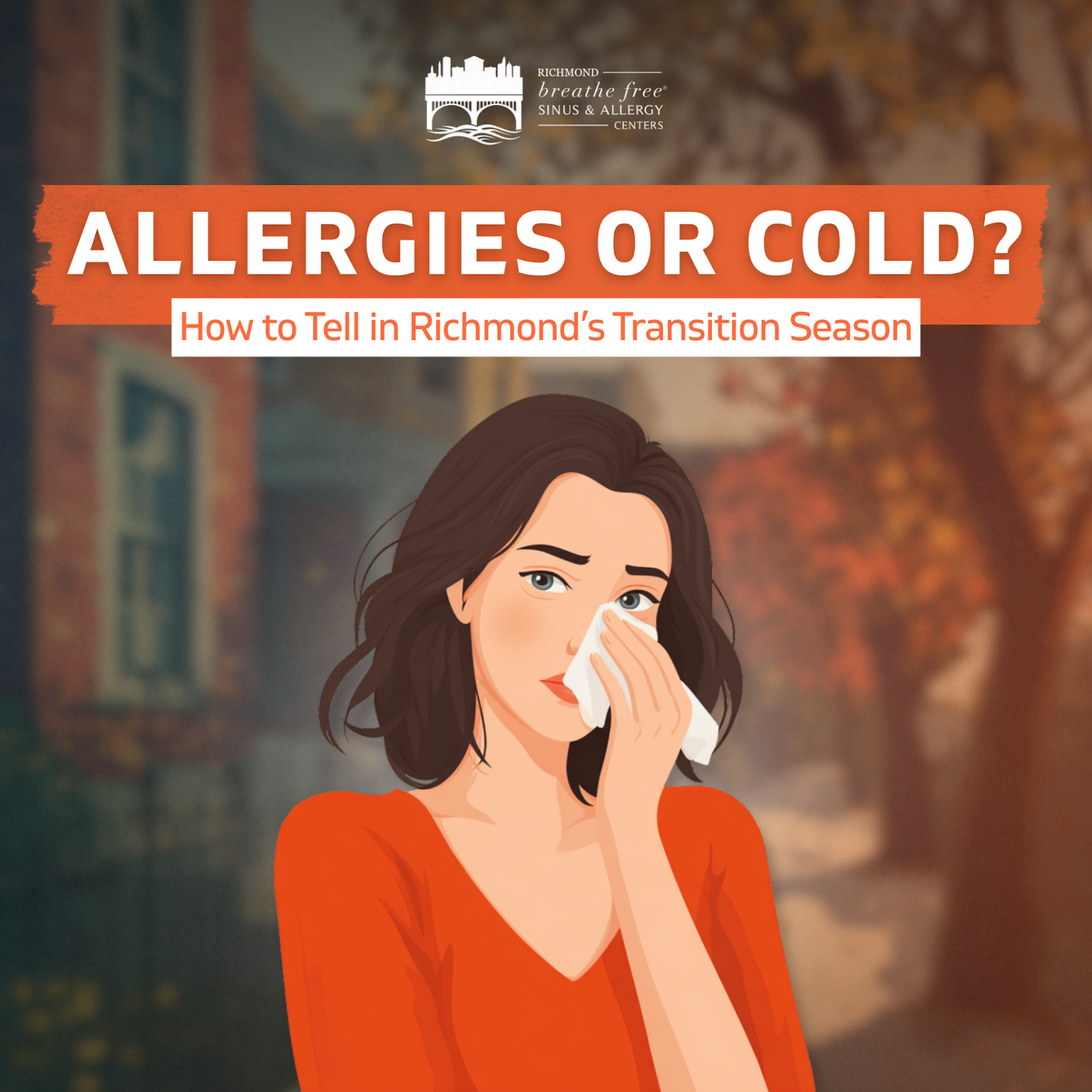Allergies or Cold? How to Tell in Richmond’s Transition Season
Richmond’s weather is famously unpredictable. One day it's sunny and warm, and the next, you’re bundling up against a sudden chill. These seasonal shifts—especially from summer to fall and winter to spring—often bring a wave of sniffles, congestion, and sore throats. The challenge? Knowing whether you’re dealing with a cold or seasonal allergies.
Because the symptoms often overlap, it’s easy to confuse one for the other. But understanding the difference can help you choose the right treatment, avoid unnecessary medications, and feel better faster.

Why It’s Hard to Tell in Richmond
The transitional seasons in Richmond create a perfect storm of overlapping allergy and illness triggers. Tree pollen, ragweed, mold spores, and indoor allergens like dust or pet dander are common during these times. Meanwhile, cooler weather often means spending more time indoors—where viruses can spread more easily.
Because symptoms from both conditions can appear around the same time, it’s common to misread what your body is reacting to. Treating allergies like a cold—or vice versa—can delay relief and increase discomfort.
How to Tell the Difference: Cold vs. Allergy
Though colds and allergies can cause similar upper respiratory symptoms, a few key differences can help you narrow it down:
Cold Symptoms May Include:
- Stuffy or runny nose (often starts clear, then thickens)
- Sore throat, especially early on
- Mild body aches or fatigue
- Occasional low-grade fever
- Symptoms that peak within a few days and resolve in 7–10 days
Allergy Symptoms Often Include:
- Clear, watery nasal discharge
- Sneezing fits or multiple sneezes in a row
- Itchy eyes, nose, or throat
- Nasal congestion without fever
- Symptoms that last for weeks or reappear with exposure to allergens
Timing Can Be a Clue
Think about when your symptoms started and how they’ve progressed:
- Colds often develop gradually, especially after being in close contact with someone who’s sick.
- Allergies tend to flare up suddenly—often triggered by a spike in pollen, mold exposure, or time spent outdoors.
In Richmond, pollen counts can rise quickly during transitional weather. If your symptoms started after a windy day or yard work, allergies may be the culprit. But if your symptoms developed slowly and include aches or fever, it could be a cold.
Managing Symptoms at Home
If your symptoms are mild, you may be able to manage them with supportive care. However, the approach differs depending on the cause:
For Colds:
- Rest and stay well-hydrated
- Use a humidifier to ease congestion
- Try saline nasal sprays to keep nasal passages moist
- Consider over-the-counter medications for pain, congestion, or fever (as advised by your provider)
For Allergies:
- Keep windows closed during high pollen days
- Use air filters or purifiers indoors
- Rinse nasal passages with saline to reduce allergen exposure
- Ask your provider if an over-the-counter antihistamine is appropriate
When to See an ENT in Richmond
If your symptoms don’t improve or keep coming back, it may be time to consult an ENT (Ear, Nose & Throat) specialist in Richmond. This is especially important if you notice:
- Chronic sinus infections
- Persistent nasal congestion or difficulty breathing
- Symptoms that last more than 10 days
- Year-round nasal or sinus issues
An ENT can perform targeted testing—such as allergy testing or nasal endoscopy—to determine whether your symptoms are caused by allergies, infection, or something else entirely. Getting the right diagnosis helps ensure the most effective treatment plan.
Don’t Guess—Get Clarity with Richmond Breathe Free
Understanding the difference between a cold and allergies is important, especially in a city like Richmond, where rapid weather changes can contribute to shifting allergy and cold symptoms.
At Richmond Breathe Free Sinus & Allergy Centers, we help patients across Central Virginia get to the root of recurring congestion, sneezing, and sinus discomfort. Whether you're dealing with seasonal allergies or chronic sinus issues, our ENT providers offer testing and personalized care options designed to help manage your symptoms and improve your comfort.
📅 Schedule a Consultation Today
If you’re unsure whether your symptoms are allergy-related, viral, or something else entirely, don’t wait. Book a consultation with Richmond Breathe Free and take the first step toward answers and a personalized care plan that may help reduce your symptoms.

.png)